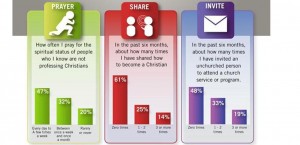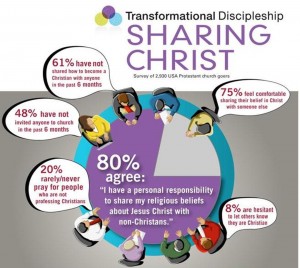Knowing that it’s important to share one’s faith in Christ doesn’t mean it’s easy to do so, a recent study from the US Lifeway Christian Resources reports.
According to a recent survey of churches in the US, 80 percent of regular churchgoers are convinced that sharing their faith is important, but the majority struggle to do so.
Three quarters of churchgoers surveyed said they felt comfortable in their ability to effectively communicate the gospel. Yet, over a period of six months, the report found that 61 per cent of Christians had not told another person about how to become a Christian.
Nearly half of those surveyed (48 per cent) admitted they hadn’t invited someone to church or a church event over the previous six months.
Jono Green, Communications Manager at Alpha Australia, believes the US statistics reflect a similar Australian sentiment. Green, and other Alpha staff from around the country, speak with several hundred Australian pastors a year.
“Anecdotally,” he says, “I would say that if a survey of Australian Christians was done, we’d probably be looking at fairly similar numbers – but the US numbers may actually be a little better than potential Australian results.”
Green believes part of the problem for Australian churches, in their struggle with evangelism, is the result of an emphasis on discipleship in their teaching. “Part of it is what I would term a ‘holy huddle’,” he says. “Australian churches have tended to be focused on discipleship more than evangelism. They focus on growing in small groups, and encouragement to live as Christians, which are all good things.
“But this creates a church with people who don’t really have that many friends outside of their Christian groups. What I’ve seen is that people in churches seem to be choosing friends from church to spend their time with, and form social groups with other Christians, so they don’t have relationships with people who they’re able to share their faith with.”
Green believes that while up to three quarters of Australian Christians may also be comfortable in their ability to effectively communicate the gospel, it’s finding and taking the opportunities to do so which is the challenge.
“I don’t think the majority of Christians in Australia would have the confidence to find and take the opportunity to communicate the gospel. Maybe if Christians are given the opportunity, they would be able to share their faith; but the struggle is really finding the confidence to step into those opportunities.”
The US report indicates over half of Christians surveyed had not invited anyone to church or church events. But Bruce Hall, Director of Evangelism and New Churches in Sydney, says that in his experience, Christians are fairly happy to invite non-believing friends to events.
However, he says there is “often a feeling of being ‘worn out’ – both by those Christians who have invited their friends to numerous church events, and by those being invited.”
Green says that the Alpha Course has been adopted by churches looking for a way to make it easier for Christians to invite their friends to a church event. “What I’ve seen is that the Alpha Course has become an event which Christians are comfortable inviting friends to.
“When we’ve had conversations with pastors, sometimes they say, ‘Look, we really haven’t known what to do with evangelism. We know it’s important, but we don’t know what to do.’
“[The course is] all about building relationships with those who come. A lot of churches have found the course as a really great way to kick start evangelism in their churches.”
According to Ed Stetzer, president of LifeWay Research in the US, the assumption has often been that new Christians are most active in sharing their faith. To some extent, this assumption is borne out in Australia by the experience of Green and those running the Alpha Course.
“We often see that those people who become Christians on an Alpha are often the most excited to invite people – it’s just happened for them, and they want others to have what they have. They invited friends unashamedly and almost naively to come along to the course, which is fantastic.”
 Yet according to the US survey, Stetzer says, “People who have been a Christian longer have higher responses for sharing Christ than newer Christians. While new Christians may find it natural to share their new experience, mature Christians do it intentionally,” said Stetzer.
Yet according to the US survey, Stetzer says, “People who have been a Christian longer have higher responses for sharing Christ than newer Christians. While new Christians may find it natural to share their new experience, mature Christians do it intentionally,” said Stetzer.
This corresponds with the experience of Bruce Hall in Australia, who identifies gratitude to God and concern for the eternal destiny of friends and family as motivating factors for Christians to share their faith.
“Gratitude to God is not just in those who have become Christians recently, but also in those who have been Christians for forty years or more,” he says. “Sometimes the older they get the more motivated they are by gratitude to God. Also, the longer you’re a Christian, the sharper your concern for friends and family can become.”
Prayer for non believing friends and family was also examined in the survey, which revealed that In the study, 21 percent of churchgoers say that outside of church worship services they pray every day for people they know who are not professing Christians.
Twenty-six percent say they pray a few times a week, while 20 percent say they rarely or never pray for the spiritual status of others.
Yet both Green and Hall, and Stetzer in the US, are unanimous in their agreement that prayer is vital for evangelism. Green says, “I love a quote from Dutch Sheets, who says that ‘evangelism without prayer is like a bomb without a detonater’. Prayer is absolutely critical. We always say to people on the course, ‘before you invite someone to do the course, start praying for them’. Prayer is the first step, and is key; by praying, people are guided to the right people in their lives to invite.”
Featured image: www.sxc.hu
Email This Story
Why not send this to a friend?


